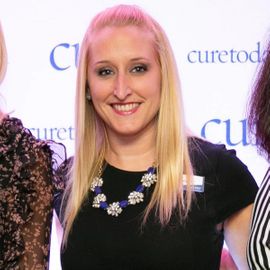- About Us
- Advertise / Support
- Editorial Board
- Contact Us
- CancerNetwork.com
- TargetedOnc.com
- OncLive.com
- OncNursingNews.com
- Terms & Conditions
- Privacy
- Do Not Sell My Information
- Washington My Health My Data
© 2025 MJH Life Sciences™ and CURE - Oncology & Cancer News for Patients & Caregivers. All rights reserved.
Physicians Recommend Ovarian Cancer Screening Based on Their Personal Experiences

Kristie L. Kahl is vice president of content at MJH Life Sciences, overseeing CURE®, CancerNetwork®, the journal ONCOLOGY, Targeted Oncology, and Urology Times®. She has been with the company since November 2017.
A recent survey of physicians revealed that 17 percent of doctors with personal experience with cancer were more likely than those without to act against established guidelines to recommend that low-risk women receive ovarian cancer screening.
Despite United States Preventive Services Task Force (USPSTF) recommendations, many physicians — especially those with a cancer experience outside of their career – reported they would recommend ovarian cancer screening in low-risk women, according to survey results published in the Journal of Women’s Health.
In particular, physicians who have had cancer themselves, or experienced cancer with a family member, close friend or coworker were 17 percent more likely than doctors without personal cancer experience to act against established guidelines.
“Most doctors are pretty comfortable with the idea that our personal experience can make a positive impact on our practice — we’ve known someone and so it gives us insight into how to take care of patients in similar circumstances,” study author Margaret Ragland, M.D., pulmonary critical care specialist at CU Health University of Colorado Hospital in Aurora, said in a press release.
“This study helps us realize that sometimes it can go beyond that,” she added. “Personal experiences can impact our practice in a variety of ways.”
In the guidelines, the USPSTF recommends against screening for ovarian cancer in asymptomatic women who are not known to have a high-risk hereditary cancer syndrome. The USPSTF gave ovarian cancer screening a grade D, meaning that it discouraged the practice and has “moderate or high certainty that the service has no net benefit or that the harms outweigh the benefits.”
However, many physicians still recommend for screening, which could potentially expose women to unnecessary risk from false-positive results. “Some people may think, ‘What’s the harm in doing testing that’s not indicated? I’m going to get a negative test and it’ll make my patient feel better.’ But if you find something, it can lead to further follow up, causing complications, cost, and anxiety,” Ragland said.
Since little research exists to support why physicians are making these recommendations, the researchers set out to examine the association between physicians' nonprofessional experience with cancer and reported adherence to ovarian cancer screening guidelines.
The researchers mailed a 12-page questionnaire with an annual examination vignette and questions about cancer screening recommendations to a random sample of 3,200 U.S. family physicians, general internists, and obstetrician-gynecologists. One question asked whether any immediate family members; extended family members, close friends, or coworkers; or the physician him or herself had been diagnosed with cancer. After presenting their respective vignette, for which 48 were sent out in total, physicians were also asked how often they would offer or order specific tests and studies (almost never, sometimes or almost always) for that specific patient at that visit.
Overall, 497 physicians responded to the survey.
In unadjusted analyses, 86 percent of professionals with no personal experience with cancer reported adherence to ovarian cancer screening guidelines compared with 69.2 percent of physicians with nonprofessional experience with cancer.
In adjusted analysis, physicians with cancer themselves or in a family member or close friend/coworker were 0.82 times less likely to report adhering to ovarian cancer screening recommendations than those without personal cancer experience.
Further, when presented with a vignette describing a woman of average risk for ovarian cancer, 31.8 percent of primary care doctors who had personal experience of cancer chose to offer this screening compared with only 14 percent of doctors without personal experience of cancer.
“We’re physicians, but we also have life experiences,” Ragland said. “What this study tells us is that in ways we may not be aware, for better and for worse, our personal experience may affect our practice.”
The researchers noted that additional studies are necessary to help address higher rates of non-recommended screening among low-risk women, given this carries potential risk for these women.
“Given the important impacts that physicians' nonprofessional cancer experiences can have on patient care, further work is needed to understand this unintended phenomenon, to increase medical providers' awareness of these influences, and to develop strategies to ensure that these providers' practices reflect evidence-based practices that are truly appropriate for their patients,” they wrote.
Related Content:



